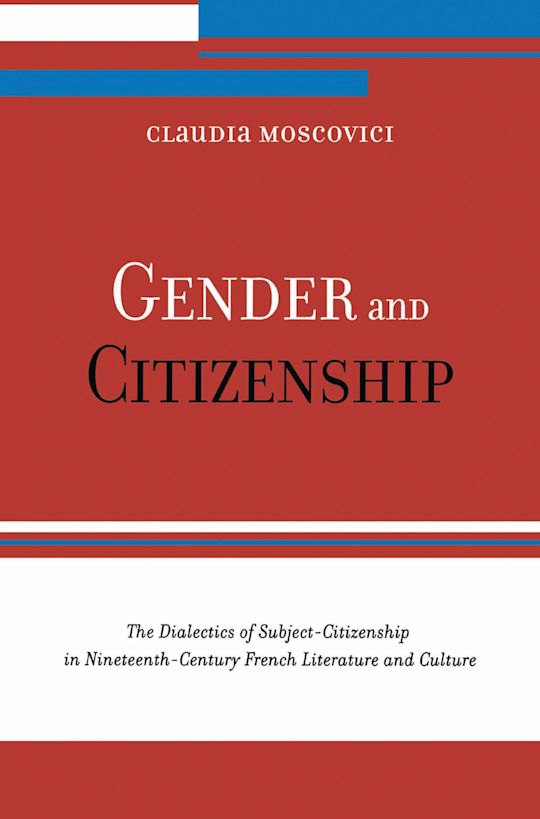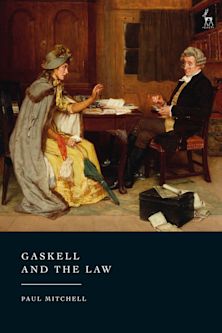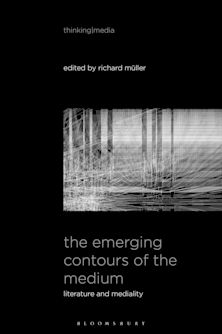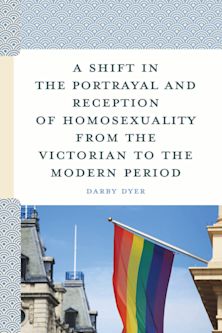- Home
- ACADEMIC
- Literary Studies
- Literary Studies - Other
- Gender and Citizenship
Gender and Citizenship
The Dialectics of Subject-Citizenship in Nineteenth Century French Literature and Culture
Gender and Citizenship
The Dialectics of Subject-Citizenship in Nineteenth Century French Literature and Culture
You must sign in to add this item to your wishlist. Please sign in or create an account
Description
Moscovici proposes a new understanding of how gender relations were reformulated by both male and female writers in nineteenth-century France. She analyzes the different versions of gendered citizenship elaborated by Friedrich Hegel, George Sand, Honore de Balzac, Auguste Comte and Herculine Barbin revealing a shift from a single dialectical (or male-centered) definition of citizenship to a double dialectical (or bi-gendered) one in which each sex plays an important role in subject-citizenship and is defined as the negation of the other sex. Moscovici further argues that a double dialectical pattern of androgyny endows women with a (relational) cultural identity that secures their paradoxical roles as both representatives and outsiders to subject-citizenship in nineteenth-century French society and culture.
Table of Contents
Chapter 2 Introduction: The Dialectics of Subject-Citizenship
Chapter 3 Theoretical Foundations: Doubling the Foundations
Chapter 4 The Social Model of Citizenship: Comte'sA General View of Positivism
Chapter 5 Gendered Spheres in Balzac'sLa Cousine Bette
Chapter 6 Exemplary Androgyny in Sand'sIndiana
Chapter 7 Gender Trouble in the Diary of Herculine Barbin: Unreading Foucault
Chapter 8 Conclusion: Androgyny and the Chiasmic Economy of Sexual Difference
Chapter 9 Bibliography
Chapter 10 Index
Chapter 11 About the Author
Product details
| Published | May 10 2000 |
|---|---|
| Format | Ebook (Epub & Mobi) |
| Edition | 1st |
| Extent | 160 |
| ISBN | 9780742581296 |
| Imprint | Rowman & Littlefield Publishers |
| Publisher | Bloomsbury Publishing |
About the contributors
Reviews
-
A fascinating and enlightening read.
Modern Language Review
-
This book compellingly advances our understanding of the relation between gender and citizenship in French nineteenth-century contexts. As such, it represents a valuable contribution to any discourse seeking to de-naturalize sexual difference within modern cultures.
French Forum
-
Gender and Citizenship brings together a number of important debates in feminist scholarship in interesting ways. . . . Moscovici helps us get beyond two poles which have too frequently sundered feminist theory: the pole represented by difference feminism that has worked to preserve what has been unique to women's situations and the pole represented by more integrationist models that has worked to overcome women's differences from men.
Linda Nicholson, Susan E. and William P. Stiritiz Distinguished Professor of Women's Studies, Washington University, St. Louis
-
Although Claudia Moscovici does not discuss the parity movement in her insightful, new book, the 'paritaires' might be said to acknowledge what she calls 'the fundamental androgyny of the citizen-subject' and which is already in evidence in the nineteenth century. . . . Recognizing the self-contradictory nature of gender identity also allows us better to understand what feminist historian Joan Scott has labeled the 'paradoxical' positioning of women in relation to the public sphere-the very paradox that the paritaries in France are facing today. Their efforts to sex the universal and so double the individual represented by it would find theoretical support in Moscovici's examination of the emergence of a double dialectic.
Novel: A Forum On Fiction


































